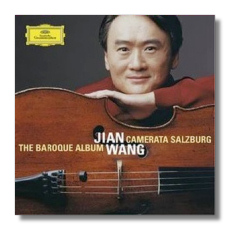
The Internet's Premier Classical Music Source
Related Links
-
Boccherini Reviews
Cassadó Reviews
F. Couperin Reviews
Monn Reviews - Latest Reviews
- More Reviews
-
By Composer
-
Collections
DVD & Blu-ray
Books
Concert Reviews
Articles/Interviews
Software
Audio
Search Amazon
Recommended Links
Site News
 CD Review
CD Review
The Baroque Album

- Luigi Boccherini: Cello Concerto #9 in B Flat Major, G 482
- François Couperin: Pièces de concert (arr. Bazelaire)
- Gaspar Cassadó: Toccata à la Frescobaldi (arr. Toister)
- Georg Matthias Monn: Cello Concerto in G minor
Jian Wang, cello
Camerata Salzburg
Deutsche Grammophon 474236-2 DDD 56:22
This is the second Deutsche Grammophon CD on which Jian Wang is the featured soloist; the first was an album of Haydn's Cello Concertos (463180-2). (He's also recorded the Brahms Double Concerto with Gil Shaham and Claudio Abbado – DG 469529-2.) The cellist was born in China in 1968, and studied at the Shanghai Conservatory. Thanks to the impression he made on the visiting Isaac Stern, he later came to the Yale School of Music to study with Aldo Parisot.
DG gives the CD the omnibus title "The Baroque Album." Fair enough, but this is Baroque music as it was understood in the middle of the previous century, not as it is understood today. Three of the four works are played not quite as the composer originally imagined them. The Couperin (François, not Louis) is a 1924-vintage arrangement, scored for cello and string quartet, of five pieces from the composer's Concerts royaux. Frescobaldi's Toccata was written for the keyboard; cellist Gaspar Cassadó arranged it for cello and piano circa 1925, and then cellist Doron Toister arranged Cassadó's arrangement for cello and strings. Most people know Georg Matthias Monn's concerto in the realization by Arnold Schoenberg (of all people). The novelty here is that Jian Wang has discarded Schoenberg in favor of a more recent realization by Olivér Nagy. Only the Boccherini is performed in a completely unadulterated edition, and this is ironic, because the concerto is much more famous in a very corrupt edition by one Friedrich Grützmacher, so many listeners will not be entirely familiar with the concerto as it is performed here!
These performances, then, do not aspire to authenticity, whatever that is. If one accepts that, then one is left with a very enjoyable CD. The music, while not unforgettable, is consistently attractive. (One could argue, however, that this is a rather motley assembly of Baroque works – imagine Italians, a Frenchman, and an Austrian rubbing elbows like this in the 17th and 18th centuries!) Jian Wang doesn't scale back his big sound – this is Baroque music gone all fat and sassy – but his technique is very clean, and he keeps away from interpretive distortions. The Camerata Salzburg (conductorless? did the soloist do the honors?) matches Jian Wang with a sound that is healthy, in no way undernourished, and yet straitlaced enough to pass muster stylistically. This is Baroque music that is like a famous brand of baby shampoo: no tears and no tangles.
This recording was made in the Salzburg Mozarteum in December 2002. The engineering is warm, and an appropriate balance between the cellist and his partners is maintained. Michael Jameson's booklet note is a good one.
Copyright © 2003, Raymond Tuttle





















